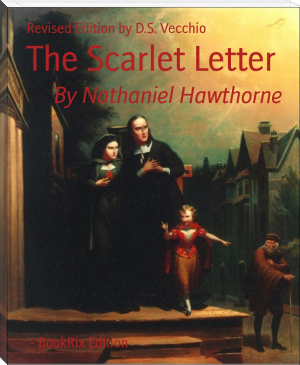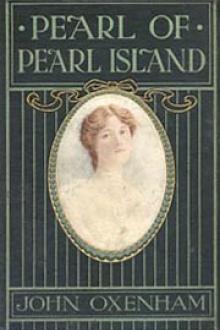The Scarlet Letter, Revised Edition by D.S. Vecchio [simple e reader txt] 📗

- Author: Revised Edition by D.S. Vecchio
Book online «The Scarlet Letter, Revised Edition by D.S. Vecchio [simple e reader txt] 📗». Author Revised Edition by D.S. Vecchio
Roger Chillingworth possessed all, or most, of the attributes above enumerated. Nevertheless, time went on; a kind of intimacy, as we have said, grew up between these two cultivated minds, which had as wide a field as the whole sphere of human thought and study to meet upon; they discussed every topic of ethics and religion, of public affairs, and private character; they talked much, on both sides, of matters that seemed personal to themselves; and yet no secret, such as the physician fancied must exist there, ever stole out of the minister's consciousness into his companion's ear. The latter had his suspicions, indeed, that even the nature of Mr. Dimmesdale's bodily disease had never fairly been revealed to him. It was a strange reserve!
After a time, at a hint from Roger Chillingworth, the friends of Mr. Dimmesdale effected an arrangement by which the two were lodged in the same house; so that every ebb and flow of the minister's life-tide might pass under the eye of his anxious and attached physician. There was much joy throughout the town when this greatly desirable object was attained. It was held to be the best possible measure for the young clergyman's welfare; unless, indeed, as often urged by such as felt authorized to do so, he had selected some one of the many blooming damsels, spiritually devoted to him, to become his devoted wife. This latter step, however, there was no present prospect that Arthur Dimmesdale would be prevailed upon to take; he rejected all suggestions of the kind, as if priestly celibacy were one of his articles of Church discipline. Doomed by his own choice, therefore, as Mr. Dimmesdale so evidently was, to eat his unsavory morsel always at another's board, and endure the life-long chill which must be his lot who seeks to warm himself only at another's fireside, it truly seemed that this sagacious, experienced, benevolent old physician, with his concord of paternal and reverential love for the young pastor, was the very man, of all mankind, to be constantly within reach of his voice.
The new abode of the two friends was with a pious widow, of good social rank, who dwelt in a house covering pretty nearly the site on which the venerable structure of King's Chapel has since been built. It had the graveyard, originally Isaac Johnson's home-field, on one side, and so was well adapted to call up serious reflections, suited to their respective employments, in both minister and man of physic. The motherly care of the good widow assigned to Mr. Dimmesdale a front apartment, with a sunny exposure, and heavy window-curtains, to create a noontide shadow when desirable. The walls were hung round with tapestry, said to be from the Gobelin looms, and, at all events, representing the Scriptural story of David and Bathsheba, and Nathan the Prophet, in colors still not faded, but which made the fair woman of the scene almost as grimly picturesque as the woe-denouncing seer. Here the pale clergyman piled up his library, rich with parchment-bound folios of the Fathers, and the lore of Rabbis, and monkish erudition, of which the Protestant divines, even while they vilified and decried that class of writers, were yet constrained often to avail themselves. On the other side of the house, old Roger Chillingworth arranged his study and laboratory: not such as a modern man of science would reckon even tolerably complete, but provided with a distilling apparatus and the means of compounding drugs and chemicals, which the practiced alchemist knew well how to turn to purpose. With such commodiousness of situation, these two learned persons sat themselves down, each in his own domain, yet familiarly passing from one apartment to the other, and bestowing a mutual and not incurious inspection into one another's business.
And the Reverend Arthur Dimmesdale's best discerning friends, as we have intimated, very reasonably imagined that the hand of Providence had done all this for the purpose--besought in so many public and domestic and secret prayers--of restoring the young minister to health. But, it must now be said, another portion of the community had latterly begun to take its own view of the relation betwixt Mr. Dimmesdale and the mysterious old physician. When an uninstructed multitude attempts to see with its eyes, it is exceedingly apt to be deceived. When, however, it forms its judgment, as it usually does, on the intuitions of its great and warm heart, the conclusions thus attained are often so profound and so unerring as to possess the character of truth supernaturally revealed. The people, in the case of which we speak, could justify its prejudice against Roger Chillingworth by no fact or argument worthy of serious refutation. There was an aged handicraftsman, it is true, who had been a citizen of London at the period of Sir Thomas Overbury's murder, now some thirty years agone; he testified to having seen the physician, under some other name, which the narrator of the story had now forgotten, in company with Dr. Forman, the famous old conjurer, who was implicated in the affair of Overbury. Two or three individuals hinted that the man of skill, during his Indian captivity, had enlarged his medical attainments by joining in the incantations of the savage priests, who were universally acknowledged to be powerful enchanters, often performing seemingly miraculous cures by their skill in the black art. A large number--and many of these were persons of such sober sense and practical observation that their opinions would have been valuable in other matters—affirmed that Roger Chillingworth's aspect had undergone a remarkable change while he had dwelt in town and especially since his abode with Mr. Dimmesdale. At first, his expression had been calm, meditative,and scholar-like. Now there was something ugly and evil in his face, which they had not previously noticed, and which grew still the more obvious to sight the oftener they looked upon him. According to the vulgar idea, the fire in his laboratory had been brought from the lower regions, and was fed with infernal fuel; and so, as might be expected, his visage was getting sooty with the smoke.
To sum up the matter, it grew to be a widely diffused opinion that the Rev. Arthur Dimmesdale, like many other personages of special sanctity, in all ages of the Christian world, was haunted either by Satan himself or Satan's emissary, in the guise of old Roger Chillingworth. This diabolical agent had the Divine permission, for a season, to burrow into the clergyman's intimacy, and plot against his soul. No sensible man, it was confessed, could doubt on which side the victory would turn. The people looked, with an unshaken hope, to see the minister come forth out of the conflict transfigured with the glory which he would unquestionably win. Meanwhile, nevertheless, it was sad to think of the perchance mortal agony through which he must struggle towards his triumph.
Alas! To judge from the gloom and terror in the depth of the poor minister's eyes, the battle was a sore one, and the victory anything but secure.
X. THE LEECH AND HIS PATIENT
Old Roger Chillingworth, throughout life, had been calm in temperament, kindly, though not of warm affections, but ever, and in all his relations with the world, a pure and upright man. He had begun an investigation, as he imagined, with the severe and equal integrity of a judge, desirous only of truth, even as if the question involved no more than the air-drawn lines and figures of a geometrical problem, instead of human passions, and wrongs inflicted on himself. But, as he proceeded, a terrible fascination, a kind of fierce, though still calm, necessity, seized the old man within its gripe, and never set him free again until he had done all its bidding. He now dug into the poor clergyman's heart, like a miner searching for gold; or, rather, like a sexton delving into a grave, possibly in quest of a jewel that had been buried on the dead man's bosom, but likely to find nothing save mortality and corruption. Alas, for his own soul, if these were what he sought!
Sometimes a light glimmered out of the physician's eyes, burning blue and ominous, like the reflection of a furnace, or, let us say, like one of those gleams of ghastly fire that darted from Bunyan's awful doorway in the hillside, and quivered on the pilgrim's face. The soil where this dark miner was working had perchance shown indications that encouraged him.
"This man," said he, at one such moment, to himself, "pure as they deem him--all spiritual as he seems--hath inherited a strong animal nature from his father or his mother. Let us dig a little further in the direction of this vein!"
Then after long search into the minister's dim interior, and turning over many precious materials, in the shape of high aspirations for the welfare of his race, warm love of souls, pure sentiments, natural piety, strengthened by thought and study, and illuminated by revelation--all of which invaluable gold was perhaps no better than rubbish to the seeker--he would turn back, discouraged, and begin his quest towards another point. He groped along as stealthily, with as cautious a tread, and as wary an outlook, as a thief entering a chamber where a man lies only half asleep--or, it may be, broad awake--with purpose to steal the very treasure which this man guards as the apple of his eye. In spite of his premeditated carefulness, the floor would now and then creak; his garments would rustle; the shadow of his presence, in a forbidden proximity, would be thrown across his victim. In other words, Mr. Dimmesdale, whose sensibility of nerve often produced the effect of spiritual





Comments (0)